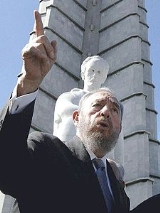
from 1959 to 1976, and then President
from 1976 to 2008. He also served as the First Secretary
of the Communist Party of Cuba
from the party's foundation in 1961 until 2011. Politically a Marxist-Leninist
, under his administration the Republic of Cuba
was converted into a one-party socialist state
, with industry and business being nationalised under state ownership and socialist
reforms implemented in all areas of society.
Born the illegitimate son of a wealthy farmer, Castro became involved in leftist anti-imperialist
politics whilst studying law at the University of Havana
.
1953 Fidel Castro leads an unsuccessful attack on the Moncada Barracks, thus beginning the Cuban Revolution.
1956 Fidel Castro declares himself at war with the President of Cuba.
1956 The ''Granma'' yacht reaches the shores of Cuba's Oriente province and Fidel Castro, Che Guevara and 80 other members of the 26th of July Movement disembark to initiate the Cuban Revolution.
1959 Fulgencio Batista, president of Cuba, is overthrown by Fidel Castro's forces during the Cuban Revolution.
1959 The United States recognizes the new Cuban government of Fidel Castro.
1959 Fidel Castro's Cuban Revolution is completed with the takeover of Santiago de Cuba.
1959 Fidel Castro becomes Premier of Cuba after dictator Fulgencio Batista was overthrown on January 1.
1960 Fidel Castro arrives in New York City as the head of the Cuban delegation to the United Nations.
1960 Fidel Castro announces Cuba's support for the U.S.S.R.
1961 Bay of Pigs Invasion: A group of CIA financed and trained Cuban refugees lands at the Bay of Pigs in Cuba with the aim of ousting Fidel Castro.
This country is heaven, in the spiritual sense of the word. And I say, we prefer to die in heaven than survive in hell.![]()
Warfare is a means and not an end. Warfare is a tool of revolutionaries. The important thing is the revolution. The important thing is the revolutionary cause, revolutionary ideas, revolutionary objectives, revolutionary sentiments, revolutionary virtues!![]()
When I was a young boy, my father taught me that to be a good Catholic, I had to confess at church if I ever had impure thoughts about a girl. That very evening, I had to rush to confess my sin. And the next night, and the next. After a week, I decided religion wasn't for me.![]()

